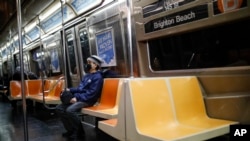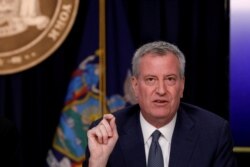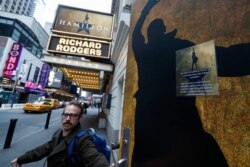New York City, the economic heart of the United States, declared a State of Emergency on Thursday help combat the coronavirus.
"We are going into a long battle. This will not be over soon," Mayor Bill de Blasio said at a news conference. "It's going to be a long battle; it's going to be a tough battle." He said that people would inevitably die.
The city of more than 8 million people has 95 confirmed cases, up from 42 on Wednesday. There are 29 people in mandatory quarantine and more than 1,700 others in voluntary quarantine.
The mayor said he expects the city to be at 1,000 confirmed cases by next week. His administration says it is ready to assist residents at its 11 hospitals. The city is equipped with some 5,000 ventilators. Health officials said they expect only 5% of those who contract the virus to require them.
"I want to be very clear," de Blasio told reporters. "There are three things we want to preserve at all costs: our schools, our mass transit and most importantly, our health care system."
In an effort to contain the spread of the virus, de Blasio announced drastic and sweeping measures.
Starting Friday, the city of more than 8 million people will prohibit gatherings of over 500 people. Broadway theaters will go dark and major sporting arenas will close. The mayor said he expects the closures to last until September.
Bars and restaurants will be allowed to continue operating, but must cut the number of patrons they serve to 50% below their legal occupancy so people can spread out.
"We are getting into a situation where the only analogy is war," de Blasio said of the city government's effort to cope with the rapidly evolving situation.
The mayor said he would also authorize more than 100,000 city workers — about a third of the municipal workforce — to either work from home or stagger their office hours, to lessen congestion on the transit system which often sees commuters tightly packed into train cars and buses during peak hours.
The city's public schools, which educate more than 1 million students, will remain open. "We want them to remain open, we intend for them to remain open," de Blasio said.
The mayor was very somber in discussing the unprecedented territory the city has suddenly found itself in. He expressed concern for the many residents who could face job and income loss due to the closing of many venues. He said the city would roll out a social services program to help those who could not afford food and would assist those who faced rent issues or eviction.
"We will unquestionably overcome this," de Blasio said. "The city will prevail in the end." But he admitted that he expects this to be a "long, painful episode."
The city is home to Wall Street, the economic heart of the nation, and it was left reeling Thursday as U.S. stocks had their worst day since the 1987 crash, plunging a staggering 10% on coronavirus fears.
United Nations
At United Nations headquarters in mid-town Manhattan, Secretary-General Antonio Guterres intensified measures to protect staff and diplomats.
More than 6,000 people normally work at the organization's New York complex. That number has been cut by nearly half in the past week, as many staff have been told to work remotely.
The U.N. chief also sent a letter to member states Thursday, informing them of his decision to cancel all U.N. meetings that are not mandatory starting Monday through the end of April.
Hospital grade cleaning solutions are being used throughout the building. So far there have been no reported coronavirus cases among headquarter's staff.
"Since the beginning of the outbreak, the Secretary-General said that we have been balancing the safety and security of staff and representatives of member states with the need to ensure that the work of the organization continues, here and around the world," his spokesman, Stephane Dujarric, told reporters.






